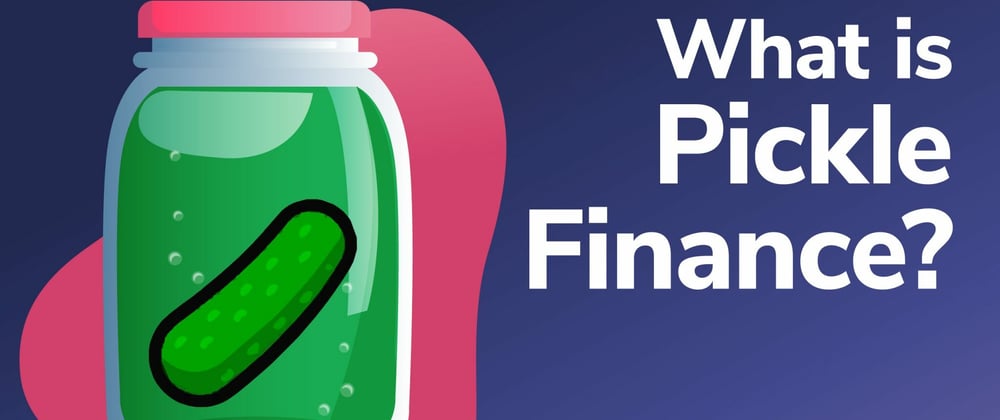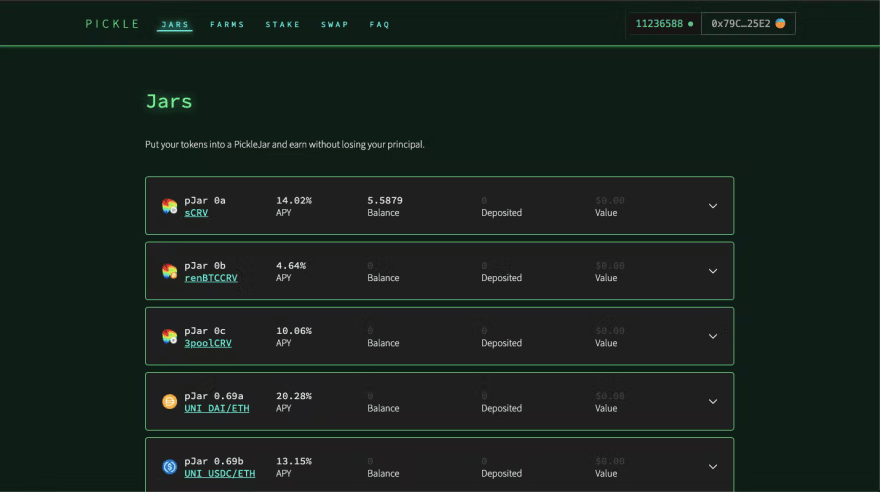This is a new series called Unveiling where I would tend to discuss a certain protocol split up in multiple blogs to cover from a general point of view about the protocol as well as try to make a project on top of it for a development perspective.
Another Project that popped up in defi summer, back in the day the motivation for the project was as stated by their team ->
Stablecoins have often gone off peg due to varying market conditions and limitations in monetary policy. The recent boom in yield farming has only exacerbated this problem as farmers buy and sell large amounts of stablecoins in order to chase the best yield.
For the DeFi ecosystem to flourish, a much more stable stablecoin ecosystem is required
*What is Pickle Finance?
*
The development of on-chain asset management protocols is one of the hottest new types of applications in the DeFi space. As more and more applications join the DeFi space everyday the number of good investment opportunities rises exponentially. With all the fly-by-night “exit scams”, “rug pulls”, and straight-up hacks, they knew it was hard for newcomers to figure out which platforms they could trust.However, the premise of Pickle Finance was that Pickle Finance’s founders noticed that farming yield hasn’t gotten any easier.With that in mind, Pickle Finance wanted to create a yield-generating DeFi protocol that earned top yields for its users, but also one that was simple to use.
Pickle’s mission is to be your one-stop shop for maximizing your returns in crypto with the lowest amount of effort. User funds are pooled in smart contracts which have automated strategies to put those funds to productive use and get higher returns than one would by simply putting money into a lending protocol like Compound or Aave. When a strategy becomes outdated a new strategy is developed by the Pickle community. As of the time of this writing, people have entrusted more than $7 million dollars with Pickle.
As a means to provide equitable access to blockchain data, Pickle Finance developed the Etherscan Developer APIs to empower developers with direct access to Etherscan’s block explorer data and services via GET/POST requests. Etherscan’s APIs are provided as a community service and without warranty, so please use what you need and no more. They’ve helped you take the first steps by writing some thorough tutorials on how to query and derive popular blockchain metrics. For power users, also added guides such as how you can programmatically verify contracts through API calls and more advanced use cases of endpoints.
*How does it work?
*
What is Dill?
Users who are willing to deposit and lock up their PICKLE tokens for a period of up to four years will be rewarded with DILL. DILL (sometimes known as vePICKLE or vote-escrow Pickle) provides holders with several benefits. These benefits are:
Participate in governance (1 vote = 1 DILL), including Snapshot voting and on-chain governance
Farm Weight Voting Rights, DILL holders get to set which farms get PICKLE emissions
Boosted Farm Rewards of up to 2.5x, DILL holders get additional weighting in the farms
Weekly Revenue Share: 45% of weekly revenue via PICKLE tokens
*Some of their products are as follows ->
*
_Pickle Jars
_
Pickle Jars allow users to deposit tokens from liquidity pools such as Uniswap/Sushiswap/Yearn, and then execute sophisticated strategies that benefit the depositor. For example, the series 0.69 Jars auto-harvest the Uniswap UNI token, sell those tokens, and purchase more Uniswap liquidity tokens on behalf of the user.
The Pickle project retains 27.5% of the profits it earns its Jar customers, currently the lowest among its peers. Of these profits, 20% is directed to the Pickle Treasury (which often benefits Pickle stakers), and 7.5% to the Development Fund.
_This diagram explains it better ->
_
_Pickle Farms
_
Pickle Farms are an additional option for yield farmers looking to maximize their yield with PICKLE token rewards from our farms. To be eligible to gain these PICKLE rewards, a user can deposit a pJar token, which they received in return for depositing into a Pickle Jar, into a matching farm. The one exception to this is the Pickle Power pool, which requires staking Uniswap PICKLE/ETH LP tokens instead of pJar tokens.
People who stake their PICKLE tokens at Pickle Finance receive profits earned by the project. Currently, that is all Treasury funds in excess of $500,000.
_Pickle Jar Swap
_
Imagine you’re earning APY in a BTC-related Jar, and due to a surge in BTC price, you’d like to switch into USD. You can do that directly at Pickle by swapping from one Jar to another, free of charge!
References =>













Top comments (0)